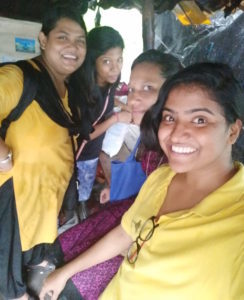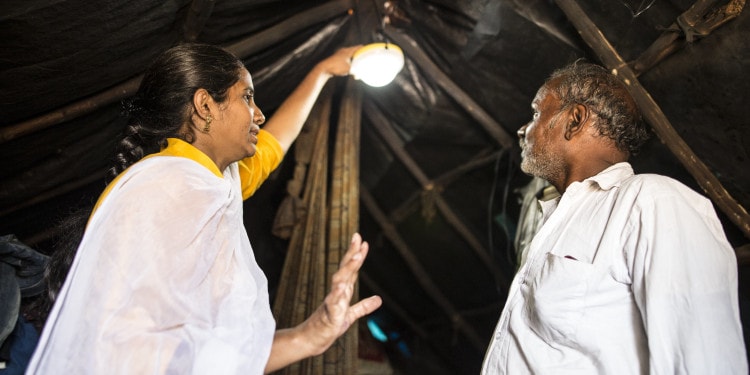In celebration of International Women’s Day 2018, a group of outstanding organisations working to empower women within the energy access sector are collaborating on a series of articles. We will be sharing stories of women’s empowerment from around the globe over the course of this month. Today, Alexie Seller discusses the momentous efforts to reach gender parity within Pollinate Energy, a social enterprise in India that delivers life-changing products to families living in India’s slum communities.
In December 2016, I was sitting in a room at our annual retreat in Chennai, India. India’s Prime Minister Narendra Modi had just declared in a bold PR move that he was demonetising the Indian cash currency, and Trump had been declared President of the US. Obviously, we were all feeling a little uncertain about where things were headed in this changing world, but we still had to focus on our organisational strategy for the coming year.
As I looked around the room at my team, something dawned on me. Although our organisation was founded by myself and five other Australians (four of us women) and had always been led by women, I was the only woman in the Pollinate Energy’s India team.
How could this happen? We, a female-led social enterprise focussing on improving lives of families (mostly women!) in Indian slum communities, suddenly had no female staff. I was shocked. I realised the scale of the problem – if we couldn’t manage to create a workplace that enabled women to join us and develop into leaders, then what hope would any other commercial company have? In India, only 17 percent of business leadership roles are held by women!
That was the moment I decided to make a change to ensure that the balance was tipped back in favour of an inclusive and diverse workplace under my leadership as CEO. Our goal for 2017? Simply to hire more women as program staff and as sales people, whom we refer to as Pollinators. I figured that was the first step. Until we achieved better gender balance in our team, we couldn’t expect significant impact empowering women through our work in the slums. According to a McKinsey study on gender parity in India, gender equality in work is heavily linked to gender equality in society. Yet, in India, more than 70 percent of women have not entered the formal labour force.

IN THE PHOTO: Pollinator Recruitment Officer Rani PHOTO CREDITS: Pollinate Energy
I managed to hire an exceptional candidate as our Pollinator Recruitment Officer, Rani, who was to champion our initiative to increase female representation amongst our sales team. Hailing from a village outside of Hyderabad, India, Rani was the youngest in a family of four. Her elder siblings are all married, have children and still live in the village they grew up in. Rani’s life could have looked like her siblings, except that Rani graduated at the top of her class in high school, which guaranteed her full government reimbursement for her post-secondary studies. After graduating, she worked as a senior development engineer, a field that few Indian women enter compared to men. When Rani’s parents fell ill, however, she had to make the difficult choice to put her rising career on hold and take care of them. It was during this challenging crossroads that she came across Pollinate Energy. Now Rani has a job where she is fulfilled, challenged and has opportunities for growth, while she is still able to stay close to her parents and care for them.
Under Rani’s leadership, we started the process of championing recruitment of women at Pollinate Energy. The end results speak for themselves – by the end of Rani’s first year, we had hired 8 women as sales representatives and 5 women as program staff members. We’ve gone from 7 percent to 42 percent female representation in our Pollinator team in the past year. We are excited about how far we have come on this journey, but it was definitely not easy and we are nowhere near done. Our next focus is on empowering more women to move into positions of leadership in our organisation, and on identifying new ways to impact women and children in the communities we serve. In essence, improving outcomes for women as our colleagues and as our customers is becoming a core element of how we operate as an organisation.
IN THE PHOTO: Pollinator Recruitment Officer Rani PHOTO CREDITS: Pollinate Energy
As the leader throughout this transition, I learned some important lessons about how to drive this kind of change at an organisational level:
- Make your team accountable, and accept that change takes time – Gender inclusion remains a huge problem, and without direct leadership and team accountability we were not going to achieve it. In this situation, it was important that I set targets for our team to recruit women, whilst acknowledging that this would prolong our recruitment process to find a suitable candidate. By taking the pressure off how quickly we recruited and instead focussing on getting a quality candidate pool, we were able to find the right people for the roles.
- Call out the bias – We all have unconscious bias. One of the key roles I played was to regularly call out biased comments and use these as learning points for our whole team on how ingrained these perceptions can be, and also how this impacts women’s experience in the workplace. This served as a constant reminder for our team, who in turn started to call out their own bias.
- Make it topical – Naming our gaps in gender diversity and making it a topic that we discussed was half the battle. Suddenly male staff members who had never even mentioned gender to me before announced that their number one achievement last month was hiring a woman. It became a moment of celebration and achievement.
- Find a mentor – We partnered up with some incredible women leaders of social businesses doing similar work, like Anya and Sita from Empower Generation in Nepal. Who have built a women-led distribution network that is 99 percent women. They provided me with advice and mentorship, and were a shining example for our team to look to.










